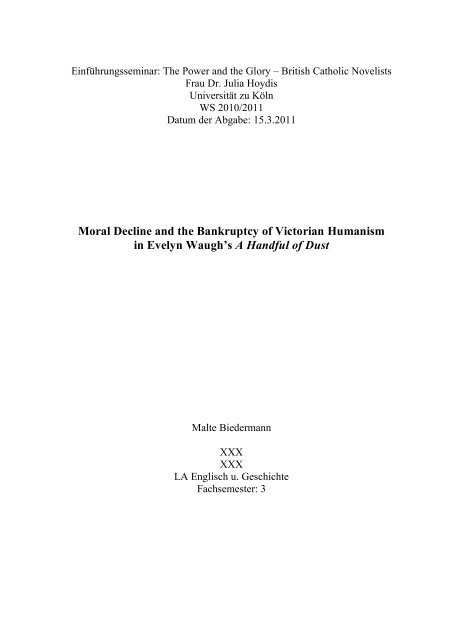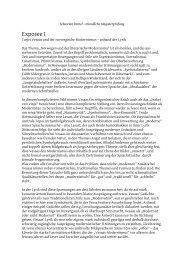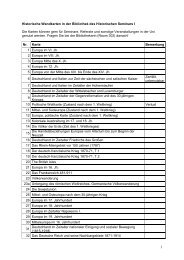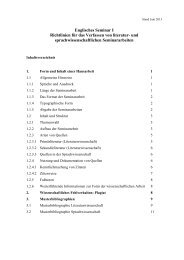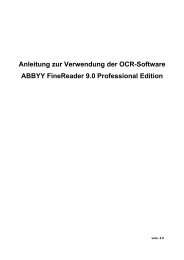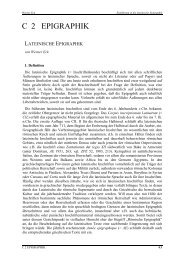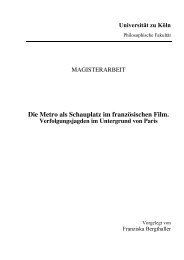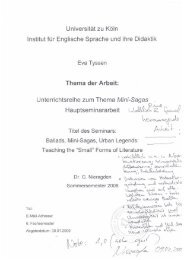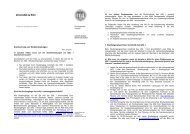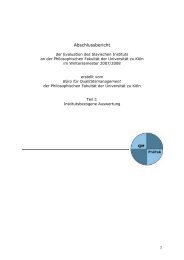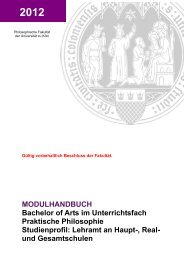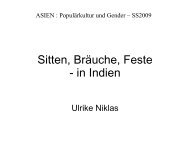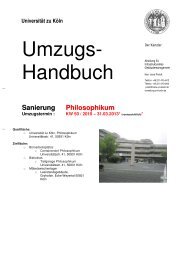Moral Decline and the Bankruptcy of Victorian Humanism in Evelyn ...
Moral Decline and the Bankruptcy of Victorian Humanism in Evelyn ...
Moral Decline and the Bankruptcy of Victorian Humanism in Evelyn ...
You also want an ePaper? Increase the reach of your titles
YUMPU automatically turns print PDFs into web optimized ePapers that Google loves.
E<strong>in</strong>führungssem<strong>in</strong>ar: The Power <strong>and</strong> <strong>the</strong> Glory – British Catholic Novelists<br />
Frau Dr. Julia Hoydis<br />
Universität zu Köln<br />
WS 2010/2011<br />
Datum der Abgabe: 15.3.2011<br />
<strong>Moral</strong> <strong>Decl<strong>in</strong>e</strong> <strong>and</strong> <strong>the</strong> <strong>Bankruptcy</strong> <strong>of</strong> <strong>Victorian</strong> <strong>Humanism</strong><br />
<strong>in</strong> <strong>Evelyn</strong> Waugh’s A H<strong>and</strong>ful <strong>of</strong> Dust<br />
Malte Biedermann<br />
XXX<br />
XXX<br />
LA Englisch u. Geschichte<br />
Fachsemester: 3
Table <strong>of</strong> Contents<br />
1. Introduction 2<br />
2. Two Types <strong>of</strong> Barbarism 4<br />
2.1. The Decay <strong>of</strong> British Society 4<br />
2.2. The Proto-Industrialist Savage 7<br />
3. The Plight <strong>of</strong> Gothic Man 8<br />
4. Conclusion 9<br />
5. Bibliography 11<br />
1
1. Introduction<br />
Asked to judge his literary oeuvre <strong>in</strong> 1946, <strong>Evelyn</strong> Waugh replied that A H<strong>and</strong>ful <strong>of</strong> Dust<br />
“was humanist <strong>and</strong> conta<strong>in</strong>ed all I had to say about humanism” (LIFE 1946: 60). He <strong>the</strong>n<br />
went on to compare it with his later work, <strong>the</strong> explicitly Catholic novel Brideshead<br />
Revisited, which he deemed his favourite <strong>and</strong> “far more ambitious”. At <strong>the</strong> time <strong>of</strong> <strong>the</strong>se<br />
statements <strong>the</strong> author had already implemented a change that found little acclaim with his<br />
critics who accused him <strong>of</strong> turn<strong>in</strong>g “from <strong>the</strong> brilliant satirical novelist to <strong>the</strong> triumphalist<br />
apologist […] from <strong>the</strong> thoughtful critic to <strong>the</strong> scorer <strong>of</strong> worthless debat<strong>in</strong>g po<strong>in</strong>ts”<br />
(O’Donoghue 1987: 345). Waugh had <strong>in</strong>deed become a staunch conservative <strong>and</strong> fervent<br />
defender <strong>of</strong> Catholicism dur<strong>in</strong>g <strong>the</strong> course <strong>of</strong> his life. In his later years he constantly<br />
attacked <strong>the</strong> Anglican Church for what he considered an uprooted <strong>and</strong> consequently hollow<br />
belief system. Much <strong>of</strong> this personal development might be based on <strong>the</strong> author’s<br />
reflections on A H<strong>and</strong>ful <strong>of</strong> Dust whose depiction <strong>of</strong> societal decay still allows ambiguous<br />
<strong>in</strong>terpretations regard<strong>in</strong>g its philosophical implications but whose central message is stated<br />
very clearly: humanism – or more precisely what Waugh considered <strong>the</strong> <strong>Victorian</strong> br<strong>and</strong> <strong>of</strong><br />
it – is a failed project, a “dead end” (Lobb 2003/2004: 143). This term paper will argue that<br />
Waugh illustrates <strong>the</strong> bankruptcy <strong>of</strong> a certa<strong>in</strong> humanist creed that denies its roots <strong>in</strong><br />
Christian moral <strong>the</strong>ology <strong>and</strong> postulates ethics as a man-made construction without<br />
religious foundation. A H<strong>and</strong>ful <strong>of</strong> Dust takes a gloomy view on a society that is valueless<br />
<strong>and</strong> corrupted because it has repressed religion. The novel envisages <strong>the</strong> ultimate outcome<br />
<strong>of</strong> “an attempt to enjoy <strong>the</strong> certa<strong>in</strong>ties <strong>of</strong> Christian moral st<strong>and</strong>ards without belief <strong>in</strong> what<br />
gave rise to <strong>the</strong>m” (Lobb 2003/2004: 135).<br />
The novel starts as a realist depiction <strong>of</strong> a crumbl<strong>in</strong>g marriage that mirrors <strong>the</strong> decay <strong>in</strong> <strong>the</strong><br />
morally desolate environment <strong>of</strong> Great Brita<strong>in</strong> <strong>in</strong> <strong>the</strong> <strong>in</strong>ter-war period: Tony Last owns a<br />
large Gothic mansion <strong>in</strong> <strong>the</strong> countryside, Hetton Abbey, <strong>and</strong> leads a ra<strong>the</strong>r dull, antiquated<br />
life toge<strong>the</strong>r with his wife Brenda <strong>and</strong> his son John Andrew. He spends a large portion <strong>of</strong><br />
his <strong>in</strong>come on ma<strong>in</strong>ta<strong>in</strong><strong>in</strong>g <strong>the</strong> property <strong>and</strong> disregards <strong>the</strong> <strong>in</strong>terests <strong>of</strong> his family members<br />
who are <strong>in</strong>creas<strong>in</strong>gly bored by <strong>the</strong>ir outmoded existence. Due to this marital neglect<br />
Brenda beg<strong>in</strong>s an affair with an impecunious <strong>and</strong> ill-mannered acqua<strong>in</strong>tance, John Beaver.<br />
After <strong>the</strong> tragic death <strong>of</strong> John Andrew <strong>in</strong> a horse-rid<strong>in</strong>g accident Brenda f<strong>in</strong>ally breaks up<br />
with her husb<strong>and</strong>. Tony, who <strong>in</strong>itially assumes that <strong>the</strong> divorce is based on mutual consent,<br />
is shocked when Brenda dem<strong>and</strong>s a monetary settlement so large that it would force him to<br />
sell Hetton.<br />
2
The novel <strong>the</strong>n takes a turn for <strong>the</strong> unreal as Tony refuses to file for a divorce <strong>and</strong> tries to<br />
escape from this threat to his traditional lifestyle by participat<strong>in</strong>g <strong>in</strong> an expedition to <strong>the</strong><br />
Brazilian jungle. Inspired by <strong>the</strong> explorer Dr. Mess<strong>in</strong>ger, he embarks on a quest to f<strong>in</strong>d an<br />
uncharted city which he comes to idealize as a “transfigured Hetton” (Waugh 1934: 164) 1 .<br />
However, his voyage soon turns out to be a disaster as he is separated from his fellow<br />
adventurers <strong>and</strong> f<strong>in</strong>ds himself struck by tropical fever <strong>in</strong> an isolated tribal village. He is<br />
nursed by <strong>the</strong> illiterate Mr. Todd who subsequently holds him captive <strong>and</strong> dem<strong>and</strong>s that<br />
Tony rema<strong>in</strong> <strong>in</strong> his hut forever while read<strong>in</strong>g <strong>the</strong> works <strong>of</strong> Dickens to him. This twist has<br />
already been criticised among Waugh’s contemporaries as misplaced <strong>in</strong> <strong>the</strong> context <strong>of</strong> <strong>the</strong><br />
rest <strong>of</strong> <strong>the</strong> novel. Waugh’s friend Henry Yorke 2 wrote to him <strong>in</strong> 1934 compla<strong>in</strong><strong>in</strong>g that “<strong>the</strong><br />
end is so fantastic that it throws <strong>the</strong> rest out <strong>of</strong> proportion […] It seemed manufactured <strong>and</strong><br />
not real” (Amory 1980: 88-89). While <strong>the</strong> change <strong>in</strong> tone that Yorke refers to is admittedly<br />
somewhat disturb<strong>in</strong>g, it is a side-product <strong>of</strong> a disjunction <strong>in</strong> <strong>the</strong> plot that mattered more to<br />
Waugh than tonal coherency. Hav<strong>in</strong>g developed <strong>the</strong> jungle scenes <strong>of</strong> A H<strong>and</strong>ful <strong>of</strong> Dust<br />
first 3 , Waugh wanted to contrast two types <strong>of</strong> barbarism <strong>in</strong> his novel: <strong>the</strong> one displayed by<br />
proto-<strong>in</strong>dustrialist savages <strong>and</strong> <strong>the</strong> one <strong>in</strong>herent <strong>in</strong> British moral decay. His argument here<br />
is that due to <strong>the</strong> negligence <strong>of</strong> religious consciousness <strong>and</strong> ecclesiastical practices, <strong>the</strong>se<br />
worlds seem to fuse once aga<strong>in</strong>.<br />
The first chapter deals with <strong>the</strong>se two forms <strong>of</strong> barbarism <strong>and</strong> illustrates how Waugh<br />
ridicules <strong>the</strong> humanist approach <strong>in</strong> his satire <strong>of</strong> displacement. The next chapter analyses<br />
Tony’s allegoric quest for <strong>the</strong> City <strong>and</strong> questions whe<strong>the</strong>r his humanist long<strong>in</strong>gs could<br />
possibly be fulfilled by follow<strong>in</strong>g this path. It also takes a closer look at Tony’s entrapment<br />
<strong>and</strong> its implications. F<strong>in</strong>ally, <strong>the</strong> discussion focuses on <strong>the</strong> ambiguous <strong>in</strong>terpretations <strong>of</strong> <strong>the</strong><br />
jungle scene, ask<strong>in</strong>g if <strong>the</strong> prospect implied by this part <strong>of</strong> <strong>the</strong> book is <strong>the</strong> ultimate<br />
declaration <strong>of</strong> moral bankruptcy <strong>in</strong> Tony’s world or if it constitutes a promise <strong>of</strong><br />
redemption.<br />
1 This term paper refers to <strong>the</strong> Pengu<strong>in</strong> Modern Classics version <strong>of</strong> A H<strong>and</strong>ful <strong>of</strong> Dust (cp. Bibliography), due<br />
to various additions <strong>in</strong> this edition page numbers may differ significantly from <strong>the</strong> orig<strong>in</strong>al publication. I will<br />
subsequently abbreviate quotations taken from it <strong>in</strong> <strong>the</strong> follow<strong>in</strong>g way: (AHoD: page number).<br />
2 This novelist is better known under his pen name Henry Green.<br />
3 The chapter “A Côté de chez Todd” was orig<strong>in</strong>ally written as a short story titled “The Man Who Liked<br />
Dickens”.<br />
3
2. Two Types <strong>of</strong> Barbarism<br />
As previously mentioned, one <strong>of</strong> Waugh’s <strong>in</strong>tentions when writ<strong>in</strong>g A H<strong>and</strong>ful <strong>of</strong> Dust was<br />
to contrast two forms <strong>of</strong> barbarism: <strong>the</strong> blatantly obvious one <strong>of</strong> exotic bushmen <strong>and</strong> <strong>the</strong><br />
more oblique one <strong>in</strong> <strong>in</strong>dustrialized societies (cp. O’Donoghue 1987: 339). Waugh wrote<br />
that “<strong>the</strong> scheme was a Gothic man <strong>in</strong> <strong>the</strong> h<strong>and</strong> <strong>of</strong> savages – first Mr. Beaver etc. <strong>the</strong>n <strong>the</strong><br />
real ones” (Amory (ed.) 1980: 88). Waugh is a satirist turned Catholic, which signifies an<br />
<strong>in</strong>terest<strong>in</strong>g comb<strong>in</strong>ation for his writ<strong>in</strong>g: Timms remarks that satire <strong>and</strong> Catholic sermon<br />
“mobilise <strong>the</strong> resources <strong>of</strong> language <strong>in</strong> diametrically opposed ways., […] at <strong>the</strong> extremes <strong>of</strong><br />
<strong>the</strong> spectrum <strong>the</strong> position <strong>of</strong> satirist <strong>and</strong> Christian seem <strong>in</strong>compatible” (Timms 1995: 111).<br />
Never<strong>the</strong>less, A H<strong>and</strong>ful <strong>of</strong> Dust manages to achieve both, present<strong>in</strong>g a clearly <strong>in</strong>telligible<br />
message aga<strong>in</strong>st cultural decay <strong>and</strong> societal barbarism while employ<strong>in</strong>g a dist<strong>in</strong>ctive form<br />
<strong>of</strong> dark satire at <strong>the</strong> same time. Ann Pasternak Slater labelled this literary form as comedy<br />
<strong>of</strong> displacement expla<strong>in</strong><strong>in</strong>g that humour is created by putt<strong>in</strong>g “<strong>the</strong> right th<strong>in</strong>gs <strong>in</strong> <strong>the</strong> wrong<br />
places” (Pasternak Slater 1982: 49). The characters illustrate <strong>the</strong> barbarity <strong>of</strong> an amoral<br />
world by act<strong>in</strong>g correctly under <strong>the</strong> wrong circumstances 4 : br<strong>and</strong>y is deceptively served <strong>in</strong><br />
a champagne bottle (AHoD 74), <strong>the</strong> overly confident Dr. Mess<strong>in</strong>ger converses with <strong>the</strong><br />
Macushi Indians <strong>in</strong> ano<strong>the</strong>r exotic language <strong>and</strong> is <strong>the</strong>refore un<strong>in</strong>telligible (AHoD 177),<br />
Tony shows gentlemanly behaviour but his wife loa<strong>the</strong>s his medieval habits <strong>and</strong> his<br />
anachronistic chivalry. This causes certa<strong>in</strong> uneas<strong>in</strong>ess <strong>in</strong> <strong>the</strong> reader after he realizes that <strong>the</strong><br />
concept <strong>of</strong> displacement is universally true <strong>in</strong> Waugh’s bleak societal portrayal, it fits to<br />
<strong>the</strong> brutally barbaric jungle as well as to <strong>the</strong> covertly barbaric people <strong>of</strong> London. All<br />
human societies depicted are ultimately corrupt <strong>and</strong> give <strong>in</strong> to <strong>the</strong>ir selfish needs as <strong>in</strong><br />
London or, follow<strong>in</strong>g <strong>the</strong> pr<strong>in</strong>ciple that might is right, to <strong>the</strong> power <strong>of</strong> <strong>the</strong> strongest <strong>in</strong> <strong>the</strong><br />
Brazilian jungle.<br />
2.1. The Decay <strong>of</strong> British Society<br />
The mood <strong>of</strong> <strong>the</strong> first part <strong>of</strong> <strong>the</strong> novel, which satirizes <strong>the</strong> moral decl<strong>in</strong>e <strong>of</strong> British society<br />
as Waugh experienced it, is already established with<strong>in</strong> <strong>the</strong> first sentences. Talk<strong>in</strong>g about a<br />
fire catastrophe with her son John, Mrs. Beaver answers a question whe<strong>the</strong>r anyone was<br />
hurt as follows: “No one, I am thankful to say. […] Except two housemaids who lost <strong>the</strong>ir<br />
heads <strong>and</strong> jumped […] <strong>in</strong>to <strong>the</strong> paved court. They were <strong>in</strong> no danger” (AHoD: 7). This<br />
response is evidently despicable on many levels. Mrs. Beaver’s voic<strong>in</strong>g <strong>of</strong> sympathy for<br />
<strong>the</strong> victims is noth<strong>in</strong>g more than a pose, a fact that becomes pa<strong>in</strong>fully obvious as she<br />
4 Interest<strong>in</strong>gly, <strong>the</strong> author also notes that sometimes <strong>the</strong> reverse is true: wrong th<strong>in</strong>gs are <strong>in</strong> <strong>the</strong> right places,<br />
creat<strong>in</strong>g <strong>the</strong> same type <strong>of</strong> comedic effect (Pasternak Slater 1983: 57).<br />
4
moves on to talk about <strong>the</strong> personal ga<strong>in</strong> she could draw from <strong>the</strong> fire: “One really cannot<br />
compla<strong>in</strong>. […] everyth<strong>in</strong>g was <strong>in</strong>sured. […] I must get on to <strong>the</strong>m this morn<strong>in</strong>g” (AHoD:<br />
7). Fur<strong>the</strong>rmore, it is suggested that she apparently does not care much about <strong>the</strong><br />
housemaids’ fate as she is preoccupied with her own class <strong>and</strong> only belatedly mentions<br />
<strong>the</strong>m as casualties <strong>of</strong> <strong>the</strong> event. The blatant exposure <strong>of</strong> her feigned empathy is so<br />
grotesque that it functions as a satirical element. As Greenberg rightly po<strong>in</strong>ts out, “we<br />
laugh at <strong>the</strong> virtual nakedness <strong>of</strong> Mrs. Beaver’s greed, or <strong>the</strong> shabb<strong>in</strong>ess <strong>of</strong> her effort to<br />
cloak this greed <strong>in</strong> false compassion” (Greenberg 2003: 354). O<strong>the</strong>r characters <strong>in</strong> Tony’s<br />
circle <strong>of</strong> acqua<strong>in</strong>tances display a similar lack <strong>of</strong> proper judgement <strong>in</strong> moral issues: his<br />
unfaithful wife, <strong>the</strong> tasteless hypocrite Mrs. Beaver, or his spoilt child John Andrew. John<br />
Beaver is, as Firchow rightly observes, “<strong>the</strong> archetype <strong>of</strong> modern man, bored, bor<strong>in</strong>g,<br />
bestial, […] his life centered on problems <strong>of</strong> cadg<strong>in</strong>g a meal or climb<strong>in</strong>g up a rung on <strong>the</strong><br />
social ladder” (Firchow 1972: 409).When Brenda reads to Tony from <strong>the</strong> morn<strong>in</strong>g papers it<br />
becomes obvious just how <strong>in</strong>different <strong>the</strong> characters react to atrocities: “There’s such an<br />
extraord<strong>in</strong>ary picture <strong>of</strong> Babe <strong>and</strong> Jock […] a little girl has been strangled <strong>in</strong> a cemetery<br />
with a bootlace […] that play […] is com<strong>in</strong>g <strong>of</strong>” (AHoD: 20). Mentions <strong>of</strong> violent crimes<br />
are <strong>in</strong>terspersed with daily gossip <strong>and</strong> do not provoke any reaction at all. At times <strong>the</strong>y are<br />
simply cast aside <strong>and</strong> ignored, at o<strong>the</strong>r times <strong>the</strong>y are answered with a ritualized expression<br />
<strong>of</strong> fake commiseration.<br />
The difference <strong>in</strong> emotional capability between Tony <strong>and</strong> his family, let alone his o<strong>the</strong>r<br />
acqua<strong>in</strong>tances, is frequently h<strong>in</strong>ted at. For <strong>in</strong>stance, his son John relates <strong>the</strong> story <strong>of</strong><br />
Pepperm<strong>in</strong>t <strong>the</strong> mule to him, which he, <strong>in</strong> turn, heard from Ben, <strong>the</strong> stable manager, as <strong>the</strong>y<br />
are on <strong>the</strong>ir way to church. Pepperm<strong>in</strong>t served as a pack animal <strong>in</strong> World War I <strong>and</strong> died<br />
after hav<strong>in</strong>g drunk its company’s entire rum ration. Tony’s reply to this story is one <strong>of</strong> <strong>the</strong><br />
few cases <strong>of</strong> genu<strong>in</strong>ely expressed regret <strong>in</strong> <strong>the</strong> novel: “At <strong>the</strong> end, Tony said, ‘How very<br />
sad.’” (AHoD: 33). This brief moment <strong>of</strong> emotional au<strong>the</strong>nticity is <strong>in</strong>stantly <strong>in</strong>terrupted by<br />
John Andrew, though: “Well I thought it was sad too, but it isn’t. Ben said it made him<br />
laugh fit to bust his pants.” (AHoD: 33). Accord<strong>in</strong>g to Greenberg, “Ben f<strong>in</strong>ds comedy<br />
where Tony f<strong>in</strong>ds pathos”, but <strong>the</strong> hierarchical structure that one would normally assume<br />
between those two options is reversed s<strong>in</strong>ce it is <strong>the</strong> son who appears to be lectur<strong>in</strong>g <strong>the</strong><br />
fa<strong>the</strong>r: <strong>in</strong> A H<strong>and</strong>ful <strong>of</strong> Dust “a cruel reaction trumps a sympa<strong>the</strong>tic one” (Greenberg 2003:<br />
352). In this emotionally crippled environment, Tony Last is <strong>in</strong>deed <strong>the</strong> last <strong>of</strong> his k<strong>in</strong>d.<br />
John accepts Ben <strong>in</strong>stead <strong>of</strong> his fa<strong>the</strong>r as <strong>the</strong> authority <strong>in</strong> judg<strong>in</strong>g <strong>the</strong> tale <strong>of</strong> Pepperm<strong>in</strong>t,<br />
5
which shows not only “a failure to <strong>in</strong>still <strong>in</strong> his son <strong>the</strong> values <strong>of</strong> his social class – but also<br />
<strong>the</strong> outmoded nature <strong>of</strong> those very values.” (Greenberg 2003: 352). Tony still adheres to<br />
what might be called <strong>the</strong> <strong>Victorian</strong> social code. This code stresses <strong>the</strong> value <strong>of</strong> s<strong>in</strong>cere<br />
emotions <strong>and</strong> dem<strong>and</strong>s virtuous feel<strong>in</strong>gs <strong>and</strong>, accord<strong>in</strong>gly, chivalric behaviour. In this<br />
scene, John counters <strong>the</strong> “fatuous optimism <strong>of</strong> <strong>Victorian</strong> humanism” (Stannard 1989: 326),<br />
that his fa<strong>the</strong>r apparently still holds dear, on both ethic <strong>and</strong> aes<strong>the</strong>tic grounds as he<br />
discloses his lack <strong>of</strong> proper moral judgement once aga<strong>in</strong> <strong>and</strong> defies <strong>the</strong> sentimental<br />
dimension <strong>of</strong> <strong>the</strong> story. Sentimentality is <strong>the</strong> aspect that Dickens would have stressed <strong>in</strong><br />
order to evoke an empathic reaction <strong>in</strong> his readers by enforc<strong>in</strong>g <strong>the</strong> <strong>Victorian</strong> value codex.<br />
The rejection <strong>of</strong> any k<strong>in</strong>d <strong>of</strong> empathy by <strong>the</strong> characters <strong>in</strong> Waugh’s novel, it might be<br />
argued, is <strong>the</strong> antisentimental reflex existent <strong>in</strong> much <strong>of</strong> modernist literature as it represents<br />
“a shift <strong>in</strong> <strong>the</strong> mean<strong>in</strong>g <strong>of</strong> <strong>the</strong> word sentimental from positive overtones <strong>of</strong> sensitivity <strong>and</strong><br />
compassion toward negative connotations <strong>of</strong> excess, falseness <strong>and</strong> laxity” (Greenberg<br />
2003: 353). Tony as <strong>the</strong> exponent <strong>of</strong> <strong>Victorian</strong> sentimentality <strong>and</strong> <strong>the</strong> humanist ideals this<br />
sentimentality tries to convey faces <strong>the</strong> outright rejection <strong>of</strong> this feel<strong>in</strong>g by John Andrew.<br />
His fa<strong>the</strong>r certa<strong>in</strong>ly has an idea <strong>of</strong> <strong>the</strong>se ideals but only manages to represent <strong>the</strong>m<br />
superficially. He is, for <strong>in</strong>stance, talked <strong>in</strong>to fak<strong>in</strong>g adultery <strong>in</strong> order to facilitate <strong>the</strong><br />
divorce: an act that betrays <strong>the</strong> <strong>Victorian</strong> ideal <strong>of</strong> honesty, even if it is for a good cause.<br />
Hence, it might be reasoned fur<strong>the</strong>r that it is not simply parental neglect that has led to<br />
John Andrew’s cynical behaviour. His fa<strong>the</strong>r failed to <strong>in</strong>still <strong>the</strong> values <strong>of</strong> <strong>the</strong> <strong>Victorian</strong><br />
moral code because he himself treats <strong>the</strong>m ra<strong>the</strong>r flexibly at times. This, <strong>of</strong> course, is<br />
connected to Tony’s disregard for ecclesiastically conveyed morality which is mentioned<br />
multiple times dur<strong>in</strong>g <strong>the</strong> course <strong>of</strong> <strong>the</strong> story: dur<strong>in</strong>g a sermon “his thoughts drifted from<br />
subject to subject. […] for <strong>the</strong> most part <strong>of</strong> <strong>the</strong> morn<strong>in</strong>g he occupied himself with <strong>the</strong><br />
question <strong>of</strong> bathrooms <strong>and</strong> lavatories” (AHoD: 34). Tony only attends <strong>the</strong> sermon because<br />
he has habitualised it as part <strong>of</strong> his gentlemanly behaviour. For John Andrew, his fa<strong>the</strong>r<br />
can <strong>the</strong>refore not function as a role model. The mere pretence <strong>of</strong> gallantry without<br />
foundation to it, it is suggested, does not suffice to pass on a moral canon. In this sense,<br />
Waugh wrote a po<strong>in</strong>tedly secular novel <strong>in</strong> which <strong>the</strong> lack <strong>of</strong> Catholic belief displayed by<br />
<strong>the</strong> characters demonstrates <strong>the</strong> need for it <strong>in</strong> order to prevent societal amorality. Tony<br />
f<strong>in</strong>ally admits this truth, if only subconsciously, as his search for a transfigured Hetton is<br />
essentially a quest to <strong>in</strong>vigorate his seem<strong>in</strong>gly outmoded value system by f<strong>in</strong>d<strong>in</strong>g a<br />
fundamental mean<strong>in</strong>g to it – it is, <strong>in</strong> essence, a quest for redemption.<br />
6
2.2. The Proto-Industrialist Savage<br />
Tony’s quest <strong>in</strong> search <strong>of</strong> <strong>the</strong> City leads him to an isolated tribal village <strong>and</strong> ultimately<br />
results <strong>in</strong> his captivity <strong>in</strong> Mr. Todd’s hut. Mr Todd is <strong>the</strong> embodiment <strong>of</strong> <strong>the</strong> savage who<br />
only cares for his own well-be<strong>in</strong>g. He traps Tony <strong>and</strong> forces him to read for eternity <strong>in</strong><br />
order to satisfy his desire to experience <strong>the</strong> books <strong>of</strong> Dickens over <strong>and</strong> over aga<strong>in</strong>. In a<br />
world where <strong>the</strong> survival <strong>of</strong> <strong>the</strong> fittest is <strong>the</strong> highest dictum Mr. Todd, apparently a half-<br />
caste who chose this lifestyle, controls <strong>the</strong> <strong>in</strong>digenous population by virtue <strong>of</strong> his gun.<br />
Tony escapes <strong>the</strong> barbarism displayed by his countrymen only to be entangled <strong>in</strong> ano<strong>the</strong>r,<br />
more blatant form <strong>of</strong> barbarism <strong>in</strong>to which he is forced by <strong>the</strong> threat <strong>of</strong> physical violence.<br />
It is notable that Mr. Todd does not overtly threaten Tony. In fact, his word<strong>in</strong>g is quite<br />
polite <strong>and</strong> his courteousness mirrors Tony’s, especially s<strong>in</strong>ce it feels equally out <strong>of</strong> place <strong>in</strong><br />
<strong>the</strong> environment he lives <strong>in</strong>. However, his politeness is – even more so than Tony’s<br />
anachronistic chivalry – a mere façade that fails to hide <strong>the</strong> self-absorbed tyrant beh<strong>in</strong>d it.<br />
Mr. Todd styles himself a fa<strong>the</strong>rly figure (AHoD: 217) to <strong>the</strong> natives which illustrates his<br />
presumptuousness well as <strong>the</strong> bushmen have little o<strong>the</strong>r choice than follow<strong>in</strong>g <strong>the</strong> orders <strong>of</strong><br />
<strong>the</strong> gun owner. Just as <strong>the</strong> stereotypical savage that <strong>the</strong> contemporary British readership<br />
was afraid <strong>of</strong> at <strong>the</strong> time <strong>of</strong> <strong>the</strong> first successful colonial upris<strong>in</strong>gs Mr. Todd takes<br />
everyth<strong>in</strong>g that he wishes without any moral repulse. However, <strong>the</strong>re is ano<strong>the</strong>r, more<br />
<strong>in</strong>trigu<strong>in</strong>g side to this character: Mr. Todd likes <strong>the</strong> books <strong>of</strong> Dickens, <strong>the</strong> chronicler <strong>of</strong><br />
<strong>Victorian</strong> London. The motive <strong>of</strong> an additional punishment for Tony who has to confront<br />
<strong>the</strong> world he fled from by read<strong>in</strong>g this k<strong>in</strong>d <strong>of</strong> literature has been established multiple<br />
times. However, it is equally <strong>in</strong>terest<strong>in</strong>g to take a closer look at <strong>the</strong> implications <strong>of</strong> Mr.<br />
Todd’s reaction. He states that <strong>the</strong>re are passages <strong>in</strong> <strong>the</strong> book Little Dorrit where he always<br />
has to weep (AHoD: 221). This is Waugh’s conclusive attack on <strong>the</strong> sentimental novel. He<br />
discredits Dickens’s attempt to evoke humanist values <strong>in</strong> his readership as he suggests that<br />
savages like Mr. Todd are <strong>the</strong> type <strong>of</strong> readers drawn <strong>in</strong> by a literature aim<strong>in</strong>g at creat<strong>in</strong>g<br />
moral discernment through aes<strong>the</strong>tic effects. These predictable effects appeal to human<br />
emotions on a very basic level <strong>and</strong> it is <strong>the</strong>refore <strong>in</strong>s<strong>in</strong>uated that <strong>the</strong>y are especially<br />
appeal<strong>in</strong>g to uncivilized bushmen who allow <strong>the</strong>mselves to be carried away by such<br />
literary emotional outbursts. While this is already not compliment<strong>in</strong>g Dickens at all, <strong>the</strong><br />
behaviour <strong>of</strong> Mr. Todd implies even more because he is only touched by <strong>the</strong> literature<br />
without tak<strong>in</strong>g moral lessons from it. He rema<strong>in</strong>s a tyrant <strong>and</strong> <strong>the</strong>reby illustrates <strong>the</strong><br />
<strong>in</strong>ability <strong>of</strong> sentimentality without a deeper philosophical foundation to change a person’s<br />
morality for <strong>the</strong> better.<br />
7
3. The Plight <strong>of</strong> Gothic Man<br />
The true motivation for Tony’s voyage to Brazil has already been h<strong>in</strong>ted at previously (cp.<br />
Chapter 1): ra<strong>the</strong>r than display<strong>in</strong>g a simple form <strong>of</strong> escapism, he is on a quest to f<strong>in</strong>d<br />
redemption. Waugh’s novel is highly allegorical <strong>and</strong> it is <strong>the</strong>refore no co<strong>in</strong>cidence that <strong>the</strong><br />
bedrooms at Hetton have been given <strong>the</strong> names <strong>of</strong> knights <strong>of</strong> <strong>the</strong> Arthurian legend (AHoD:<br />
17/18). Not only do <strong>the</strong>se names <strong>in</strong>form us about <strong>the</strong> proprietors <strong>of</strong> <strong>the</strong> respective rooms,<br />
<strong>the</strong>y also more generally foreshow <strong>the</strong> dimension <strong>of</strong> Tony’s quest: he is a chivalric man <strong>in</strong><br />
an unknightly world whose “quest for <strong>the</strong> city”, as Cunn<strong>in</strong>gham puts it, “is also a quest for<br />
<strong>the</strong> grail” (Cunn<strong>in</strong>gham 1993:121). Aga<strong>in</strong>, <strong>the</strong> o<strong>the</strong>r characters <strong>of</strong> <strong>the</strong> novel would<br />
arguably f<strong>in</strong>d this k<strong>in</strong>d <strong>of</strong> motivation naïve at best. Tony’s existence <strong>in</strong> an amoral world<br />
signifies a constant contrast between different realms: death (or a state close to it <strong>in</strong> his<br />
un<strong>in</strong>spired environment) <strong>and</strong> life, <strong>the</strong> vulgar city <strong>of</strong> London <strong>and</strong> <strong>the</strong> sublime countryside,<br />
<strong>the</strong> past <strong>and</strong> <strong>the</strong> present. It is this contrast that renders Tony a qu<strong>in</strong>tessentially Gothic<br />
character long<strong>in</strong>g for <strong>the</strong> ext<strong>in</strong>ct <strong>Victorian</strong> order <strong>of</strong> life. Tony tries everyth<strong>in</strong>g to save last<br />
remnants <strong>of</strong> it <strong>in</strong> Hetton <strong>and</strong> when he is unable to cont<strong>in</strong>ue this self-deception due to<br />
Brenda’s monetary dem<strong>and</strong>s, he is forced to look for a system <strong>of</strong> order elsewhere.<br />
Some critics have argued that Tony’s quest is ultimately futile as he “is already spiritually<br />
dead when he leaves Engl<strong>and</strong>, <strong>and</strong> John Andrew’s death is merely a sign that Tony’s life<br />
can have no mean<strong>in</strong>gful sequel” (Dale 2006: 106), whereas o<strong>the</strong>rs have been more<br />
conciliatory. Firchow po<strong>in</strong>ts out that “Tony has found his city. The stable order <strong>and</strong> daily<br />
ritual he had enjoyed at Hetton are stored to him, <strong>in</strong> a different key, <strong>in</strong> Brazil” (Firchow<br />
1972: 416). It might be added that this key is very different, <strong>and</strong> while <strong>the</strong> critic is right <strong>in</strong><br />
his assessment that “Todd’s city does not threaten to collapse so easily as Tony’s former<br />
life” (Firchow 1972: 416) <strong>and</strong> it is true that a reduction <strong>of</strong> anarchy may <strong>in</strong>deed constitute a<br />
reward <strong>in</strong> <strong>the</strong> view <strong>of</strong> an author as obsessed with order as Waugh, <strong>the</strong> price that Tony pays<br />
for this, <strong>in</strong>clud<strong>in</strong>g <strong>the</strong> irrevocable loss <strong>of</strong> Hetton, is still very high. While Cunn<strong>in</strong>gham<br />
agrees with Firchow that A H<strong>and</strong>ful <strong>of</strong> Dust <strong>of</strong>fers a form redemption <strong>in</strong> <strong>the</strong> end, he states<br />
that “<strong>in</strong> rational terms, Tony Last’s history <strong>and</strong> his condition at <strong>the</strong> end <strong>of</strong> <strong>the</strong> novel seem<br />
to be punishments too severe for his only crime – be<strong>in</strong>g tiresome” (Cunn<strong>in</strong>gham 1993:<br />
117). However, he justifies this by <strong>the</strong> “anagogic dimension” <strong>in</strong> Catholic writ<strong>in</strong>g as part <strong>of</strong><br />
<strong>the</strong> purgatory process that is required to atta<strong>in</strong> redemption. Ei<strong>the</strong>r way, Firchow’s<br />
<strong>in</strong>terpretation rema<strong>in</strong>s a dar<strong>in</strong>g one as it has to be concluded that Tony does not atta<strong>in</strong> <strong>the</strong><br />
8
edemption he strives for <strong>in</strong> <strong>the</strong> fangs <strong>of</strong> <strong>the</strong> barbarian Mr. Todd. He does not accomplish<br />
his aim <strong>of</strong> reach<strong>in</strong>g <strong>the</strong> transfigured Hetton, his old <strong>Victorian</strong> values do not ga<strong>in</strong> new<br />
vigour.<br />
4. Conclusion<br />
In A H<strong>and</strong>ful <strong>of</strong> Dust Waugh presents a dark <strong>and</strong> gloomy vision <strong>of</strong> a world without<br />
religious foundations. Accord<strong>in</strong>g to Stannard, he shows “a purely secular world, or, at<br />
least, a world whose sense <strong>of</strong> <strong>the</strong>ology was diluted by <strong>the</strong> humanism <strong>of</strong> <strong>the</strong> Reformers”<br />
(Stannard 2004/2005: 195). Tony displays an anachronistic gallantry which is habitualized<br />
<strong>and</strong> based on his idea <strong>of</strong> <strong>the</strong> <strong>Victorian</strong> value code but his effete, compromised Anglicanism<br />
does not endow him with <strong>the</strong> appropriate religious backdrop to it. Deep down, his<br />
<strong>Victorian</strong> moral philosophy is a hollow construct <strong>and</strong> <strong>the</strong>refore proves ra<strong>the</strong>r flexible<br />
regard<strong>in</strong>g his own vice such as parental <strong>and</strong> marital neglect. It is shown that humanist<br />
ideals cannot be <strong>in</strong>stilled by simply appeal<strong>in</strong>g to sentimental feel<strong>in</strong>gs <strong>in</strong> humans. Tony as a<br />
defender <strong>of</strong> <strong>Victorian</strong> ideals is <strong>the</strong>refore alone <strong>in</strong> his strife for what <strong>the</strong> rest <strong>of</strong> <strong>the</strong><br />
characters consider outmoded values. He does not manage to pass on his moral codex to<br />
his son just as nobody else <strong>of</strong> Tony’s creed seems to have managed to pass on <strong>the</strong>se values<br />
to <strong>the</strong> next generation, leav<strong>in</strong>g society <strong>in</strong> <strong>the</strong> desolate state <strong>in</strong> which it is depicted. Tony’s<br />
acqua<strong>in</strong>tances are amoral <strong>and</strong> despicable characters. As it is suggested that all human<br />
societies without a firm <strong>the</strong>ological justification <strong>of</strong> <strong>the</strong>ir positions are ultimately rotten,<br />
Tony’s escape to <strong>the</strong> jungle only <strong>of</strong>fers temporary relief. On his quest to <strong>in</strong>vigorate his<br />
values with new mean<strong>in</strong>g, he leaves one type <strong>of</strong> barbarism beh<strong>in</strong>d only to f<strong>in</strong>d himself<br />
trapped <strong>in</strong> ano<strong>the</strong>r one. While <strong>the</strong> Gothic man Tony Last may ultimately obta<strong>in</strong> some form<br />
<strong>of</strong> redemption, it comes at a high price <strong>and</strong> rema<strong>in</strong>s unsatisfy<strong>in</strong>g. Without a return to a<br />
value system founded on religion, it may be <strong>in</strong>s<strong>in</strong>uated, one cannot achieve a durable<br />
humanist education. For Waugh this religious backdrop is equivalent to his Catholic belief.<br />
Stannard sums up <strong>the</strong> idea that fuelled <strong>the</strong> creation <strong>of</strong> A H<strong>and</strong>ful <strong>of</strong> Dust <strong>in</strong> a brilliant<br />
manner when he reckons about Waugh that he writes “Catholic novels by negative<br />
suggestion, describ<strong>in</strong>g <strong>the</strong> anarchy <strong>of</strong> a world attempt<strong>in</strong>g to ma<strong>in</strong>ta<strong>in</strong> its sanity <strong>in</strong><br />
ignorance, or <strong>in</strong> rejection, <strong>of</strong> <strong>the</strong> True Faith.” For this Catholic writer, Stannard cont<strong>in</strong>ues,<br />
“<strong>the</strong> supernatural is real – but only <strong>the</strong> supernatural as mediated by <strong>the</strong> Catholic Church”<br />
(Stannard 2004/2005). Consequently, <strong>the</strong>re are no miracles <strong>in</strong> Tony’s godless world, <strong>the</strong><br />
impious do not receive Christian salvation as <strong>the</strong>y have replaced div<strong>in</strong>e law by a human-<br />
made social code that has lost <strong>in</strong> appeal by <strong>the</strong> time <strong>the</strong> novel takes place <strong>in</strong>. Waugh wrote<br />
9
a novel that is devoid <strong>of</strong> genu<strong>in</strong>e Catholic faith to illustrate just how desperately this<br />
solidly founded belief is needed to ma<strong>in</strong>ta<strong>in</strong> civil behaviour <strong>in</strong> human societies – for if we<br />
are to believe <strong>the</strong> author <strong>the</strong> <strong>Victorian</strong> attempt to <strong>in</strong>still a purely man-made value system<br />
based on sentimental appeal is doomed to fail. The Dickensian approach is bankrupt – at<br />
least from Waugh’s perspective.<br />
10
Bibliography<br />
Primary literature:<br />
Novels:<br />
Waugh, <strong>Evelyn</strong>. 2000 [1934]. A H<strong>and</strong>ful <strong>of</strong> Dust. London: Pengu<strong>in</strong> Books.<br />
Non-autonomous publications:<br />
Amory, Mark (ed.).1980. The Letters <strong>of</strong> <strong>Evelyn</strong> Waugh. London: Weidenfeld <strong>and</strong> Nicolson.<br />
88-89.<br />
Waugh, <strong>Evelyn</strong>.1946. “Fan-Fare.” Life (magaz<strong>in</strong>e) - issue: 8.4.1946. New York: Time<br />
Warner Publish<strong>in</strong>g. 53-60.<br />
Secondary literature:<br />
Monographs:<br />
Stannard, Mart<strong>in</strong>. 1989. <strong>Evelyn</strong> Waugh: The Early Years, 1903-1939. New York: W. W.<br />
Norton & Company.<br />
Essays:<br />
Cunn<strong>in</strong>gham, John. 1993. “A H<strong>and</strong>ful <strong>of</strong> Dust Reconsidered.” Core, George (ed.). The<br />
Sewanee Review 101.1. Baltimore: The John Hopk<strong>in</strong>s University Press. 115-124.<br />
Dale, Alan. 2006. “To Crie Alarme Spiritual: <strong>Evelyn</strong> Waugh <strong>and</strong> <strong>the</strong> Ironic Community.”<br />
Parsons, Deborah, <strong>and</strong> Andrzej Gasiorek (eds.). Modernist Cultures 2.2. Ed<strong>in</strong>burgh:<br />
Ed<strong>in</strong>burgh University Press. 103-114.<br />
Firchow, Peter E. 1972. “In Search <strong>of</strong> A H<strong>and</strong>ful <strong>of</strong> Dust: The Literary Background to<br />
<strong>Evelyn</strong> Waugh’s Novel.” Levitt, Morton P. (ed.). Journal <strong>of</strong> Modern Literature 2.3.<br />
Indiana: Indiana University Press. 406-416.<br />
Greenberg, Jonathan. 2003. “Was Anyone Hurt? The End <strong>of</strong> Satire <strong>in</strong> A H<strong>and</strong>ful <strong>of</strong> Dust.”<br />
Armstrong, Nancy (ed.). Novel: A Forum on Fiction 36.3. Durham: Duke University Press.<br />
351-373.<br />
Lobb, Edward. 2003/2004. “Waugh Among Modernists: Allusion <strong>and</strong> Theme <strong>in</strong> A H<strong>and</strong>ful<br />
<strong>of</strong> Dust.” Leimberg, Inge, <strong>and</strong> Matthias Bauer (eds.).Connotations 13.1-2. Münster/New<br />
York: Waxmann Verlag. 130-143.<br />
O’Donoghue, Bernard. 1987. “Waugh <strong>the</strong> Modernist.” Wall, Stephen (ed.). Essays <strong>in</strong><br />
Criticism XXXVII. Oxford: Oxford University Press. 338-345.<br />
Pasternak Slater, Ann. 1982. “Waugh’s A H<strong>and</strong>ful <strong>of</strong> Dust: Right Th<strong>in</strong>gs <strong>in</strong> Wrong<br />
Places.” Wall, Stephen (ed.). Essays <strong>in</strong> Criticism XXXII. Oxford: Oxford University Press.<br />
48-68.<br />
11
Stannard, Mart<strong>in</strong>. 2004/2005. “In Search <strong>of</strong> A City: Civilization, <strong>Humanism</strong> <strong>and</strong> English<br />
Gothic <strong>in</strong> A H<strong>and</strong>ful <strong>of</strong> Dust.” Leimberg, Inge, <strong>and</strong> Matthias Bauer (eds.). Connotations<br />
14.1-3. Münster/New York: Waxmann Verlag. 183-204.<br />
Timms, Edward. 1995. “The Christian Satirist. A Contradiction <strong>in</strong> Terms.” Bentley,<br />
Bernard P. E. (ed.). Forum for Modern Language Studies XXXI. Oxford: Oxford<br />
University Press. 101-116.<br />
12


